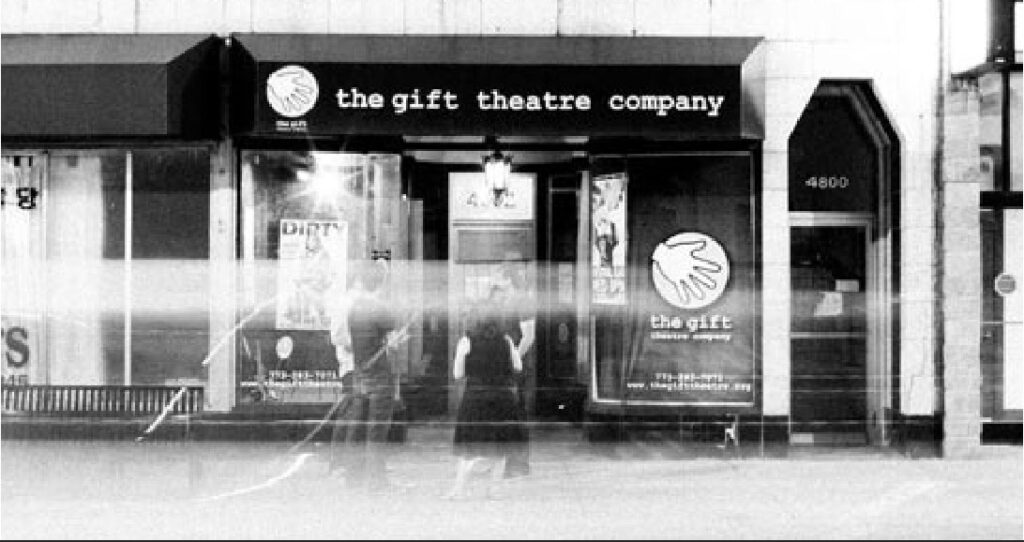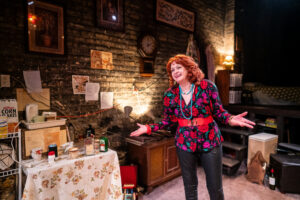
 *** Emjoy Gavino is an amazing and formidable presence in the lead role of Little Voice (a/k/a LV) in The Gift Theatre’s production of “The Rise and Fall of Little Voice.” Gavino mimics vocalists from the past as she articulates songs from the Big Band Era of swing music as well as favorites from cabaret and modern chanson genres. Gavino is delightfully outstanding and versatile in imitating voices that are gravelly to warm, rich, and velvety. It is sheer magic whenever she performs as a torchlight singer or even when she hums a melody under her breath. What an incredible and inspirational talent! Watching the show makes us not only sit up and take notice but delight in the experience of it all—and Gavino’s performance is one of the main reasons for seeing this production.
*** Emjoy Gavino is an amazing and formidable presence in the lead role of Little Voice (a/k/a LV) in The Gift Theatre’s production of “The Rise and Fall of Little Voice.” Gavino mimics vocalists from the past as she articulates songs from the Big Band Era of swing music as well as favorites from cabaret and modern chanson genres. Gavino is delightfully outstanding and versatile in imitating voices that are gravelly to warm, rich, and velvety. It is sheer magic whenever she performs as a torchlight singer or even when she hums a melody under her breath. What an incredible and inspirational talent! Watching the show makes us not only sit up and take notice but delight in the experience of it all—and Gavino’s performance is one of the main reasons for seeing this production.
The storyline of “The Rise and Fall of Little Voice” is, however, another matter. Written by Jim Cartwright, the script is a creatively inspired, modern-day mashup between the fairy tale of “Cinderella”, the romance of “Romeo and Juliet”, and the archetypal movie plot of the life of a rising star who is discovered by a major producer—and who realizes fame and fortune (or maybe not so much). Superior in spots, there are moments in the first act when the story is needlessly repetitive.
The Cinderella aspect of the tale has to do with LV’s mother, who is an alcoholic, a sex-starved floozy, and a fool all at once. In an incredible performance that’s as funny as hell, Alexandra Main plays Mari Hoff, the cruel and insensible mother who feels superior to everyone else and delights in thinking only about herself. One reason that she doesn’t give a damn about her daughter is that LV reminds her so much of her deceased husband, whom she didn’t like. But LV found him to be good and kind; she loved him dearly and found that he spoke to her every time she played the popular records that she inherited from him. What makes Mari doubly mad at her daughter is that whenever LV plays her phonograph (even ever so softly), there is a drain on their home’s dilapidated electrical system and a fuse blows. That being said, there is too much emphasis throughout on overloaded outlets and blown fuses. How many times do the lights have to go out and the characters have to sit in the dark? The audience gets the point already! After awhile, this element of the story became so distracting that I could only roll my eyes.
The Romeo and Juliet aspect of the show has to do with the romantic interest between LV and the telephone repairman Billy (Martel Manning). The two of them have a chance meeting when Billy works with a fellow telephone repairman (Watson Swift) to install a wired pink princess phone in Mari’s house. This part of the script is very cute, with Billy, for example, calling up to her second-floor bedchamber from below and later climbing up his ladder ostensibly to fix overhanging phone wires but actually to visit with her. Here is Cinderella’s contemporary handsome prince, who is albeit not rich and powerful but full of compassion and kindness.
Yet the engine that makes the story hang together is the third aspect, having to do with LV being discovered by a major producer in the name of Ray Say (Ben Veatch). LV has a big and beautiful voice, but she is shy and uninterested in sharing her talents with the world; yet he eventually draws her out. In watching the show, I was reminded of the expression, “Don’t hide your light under a bushel.” But then again, LV’s mother had no use for her daughter’s remarkable singing talent. In fact, she finds her pathetic, as the Mari prefers the contemporary music of the era, notably rock ’n roll… until she realizes that the daughter’s talent might bring her a huge sum of money. And at the beginning of the second act, M.C. and promoter Lou Boo (Watson Swift) features LV before a live audience—made up of today’s theatregoers. It is when LV finds her voice that she comes to realize the extent to which other people want to exploit her talents for their own personal gain.
The most baffling character is that of Sadie May (Julia Rowley), who, like LV, says little throughout the show. I couldn’t figure out if she was supposed to be Mari’s best friend or her caregiver or a domestic servant. She is always zipping up a dress or handing out food or holding a flashlight; but, all in all, she is a serendipitous lady-in-waiting. Why was she always at Mari’s beck-and-call? Why was Sadie so loyal in spite of Mari’s bad behavior? What was she getting out of their friendship? The character is shallow and seems largely superfluous; either that or her presence needs to be explained better.
The show is jointly directed by Devon de Mayo and Peter G. Andersen, who do a fine job moving the action along and combining realism with imagination. Scenic design by Hannah Clark is nicely done for such a small stage. Eclectic in its makeup, the set is suggestive enough to allow the audience to collectively envision life in disorganized digs, with the neatest and most organized room being LV’s garret. Prop designer Lily Anna Berman has done a very effective job with all of the bric-a-brac; I especially liked the homemade daisy quilt on LV’s bed. Costume designer kClare McKellaston has created fantastic garments for all the characters. I especially liked LV’s slinky, sexy gown and the shiny fuchsia outfit worn by Mari. Also of note are the misshapen dresses that Mari wears when she is inebriated, when she fails to realize that they don’t fit properly. Lighting designer Gabrielle Strong has done great work differentiating scenes; the use of spotlights is extremely skillful, especially those that feature LV’s act towards the end of the show. Sound design by Forrest Gregor is fine, but there are moments when the mix could have been better. Dialect coach Adam Goldstein has nicely imparted cockney accents that are understandable to an American audience. Credit also needs to go to vocal consultant Jessie Oliver and intimacy/violence director Courtney Abbott for making this show work as well as it does.
Tragically sad but funny at the same time, “The Rise and Fall of Little Voice” reveals a dysfunctional family where the mother is uncaring and a child is not loved or appreciated for the person whom they are. Raising a teenager on one’s own is not an easy task; however, ignoring them and treating them with contempt goes beyond mere self-centeredness and can lead to the destruction of all. The play also shows us what can happen when those in positions of power and influence seek to take advantage of supremely talented individuals and treat them as objects and likely sources of monetary gain. Yet dealing with contemptible people and overcoming obstacles that life brings can ultimately lead to personal growth. Most importantly, we see how unconditional love can be the antidote to misfortune. While I found myself looking at my watch a bit too much towards the end of the first act, the second act pulls things together neatly and makes a seemingly formulaic narrative more unique and special, with a clever and entertaining ending that is not entirely expected.
The Gift Theatre’s production of “The Rise and Fall of Little Voice” is playing through October 15, 2023, at Filament Theatre, 4041 N. Milwaukee Avenue, in Chicago, by the Six Corners intersection in Portage Park.
General Admission Tickets: $45
Students: $15
Veterans/Seniors: $35
 Performance schedule:
Performance schedule:
Thursdays, Fridays, and Saturdays – 7:30 p.m.
Sundays – 3:00 p.m.
To purchase tickets for “The Rise and Fall of Little Voice”, visit https://ci.ovationtix.com/36243/production/1144453 or contact the Gift Theatre’s box office at boxoffice@thegifttheatre.org or phone 773-283-7071.
For more information about this show and other offerings by the Gift Theatre, please visit https://thegifttheatre.org/.
For information about the Filament Theatre and other offerings at their venue, visit https://filamenttheatre.org/ or call 773-270-1660
While you’re in the neighborhood, be sure to visit Fantasy Costumes, at 4065 N. Milwaukee Avenue, and City News, at 4018 N. Cicero Avenue, your home for books and magazines—and a café that rivals Starbucks.
To see what others are saying, visit www.theatreinchicago.com, go to Review Round-Up and click at “






More Stories
“Dummy in Diaspora”
“The Magic School Bus: Lost in the Solar System”
“February House” reviewed by Julia W. Rath